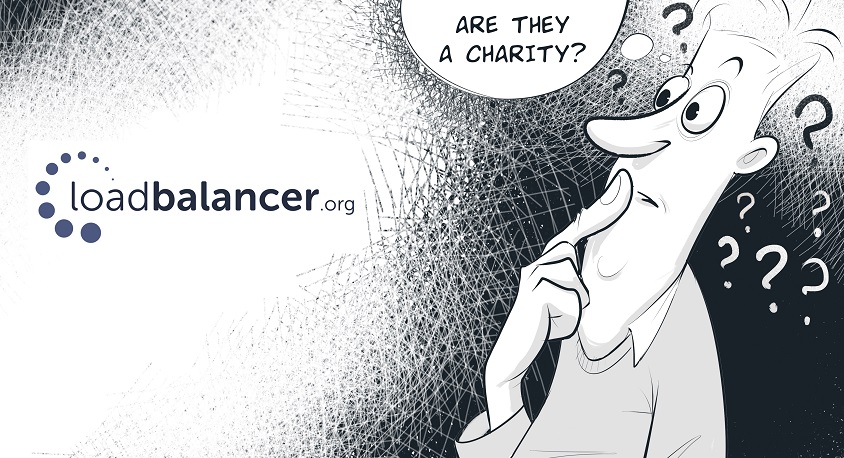
We lost a sale. It happens and it is always difficult to swallow, especially when the reason is seemingly trivial.
- Were we technically inferior? No.
- Were we more expensive? Nope.
- Was our support lacking? Far from it.
Our name. It was about our name.

What's in a name?
Loadbalancer.org was founded in 2003, driven by a gap in the market for load balancing appliances at the right price point. With roots in open-source, and at a time when far less emphasis was placed on domain names as status symbols, the company grew and the brand stuck.
The backstory of the ".org" is clearly outlined by Wikipedia:
“The domain name org is a generic top-level domain (gTLD) of the Domain Name System (DNS) used in the Internet. The name is truncated from organization. It was one of the original domains established in 1985, and has been operated by the Public Interest Registry since 2003. The domain was originally intended for non-profit entities, but this restriction was not enforced and has been removed. The domain is commonly used by schools, open-source projects, and communities, but also by some for-profit entities.”
The current way of thinking dictates that brand is everything and a good domain equals legitimacy. Noah Kagan, founder of Appsumo, spent 1.5 Million on sumo.com to own the brand - enabling him to become the definitive source and fend off imitators.
Open-source, open book
Our focus has always been on developing a reliable, robust and cost-effective load balancer. One of our strengths is transparency around core features. We highlight the fact that we leverage, customise and contribute to open-source technology.
But we are NOT open-source, and nor are we a free community product with paid-for support.
Kemp Technologies, Barracuda and Loadbalancer.org use the same open-source platform; we're honest about this. We build upon solid open-source foundations to deliver a great commercial product, winning favour with our users, who are primarily technical. They get a highly polished product which has all the features they would ever need.
The key difference is that we aren't open-source with support bolted on. If you've ever tried to solve an open-source problem without support then you will appreciate how exposed you can be if things go wrong. This is risky in a production environment.
Our product just works. And when you do need our support, we deliver it with both enthusiasm and complete commitment.
Bad reputation
The problem in this lost sale sitation was that our prospect had had their fingers burnt before.
The technicians loved the product and there wasn't a single area where they felt we fell short in comparison to our competitor. They fought our corner as the preferred option. We worked to deliver an outstanding deal on licensing, but we failed the management litmus test.
The management had a poor perception of our brand, having encountered issues with open-source and a lack of support in the past. In their eyes, we couldn’t deliver a fully supported corporate solution. They wanted no association with anything “.org” related.
So, open-source still has a reputation to shake off.
There is a lot of weight to the open-source argument. Nearly every viable open-source project has a commercial entity. We don’t fall into that category, though.
Like us, many network hardware vendors (not just in application delivery) use a combination of Linux/BSD/open-source DB/open-source web server/framework in commercial products. Even ASP.net from Microsoft is open- source and runs natively on Linux.
Conversely, just because something is completely proprietary doesn't mean it is any good.
Outside of this sale, does it matter?
This sparked a few internal discussions about our brand, and who we appeal to.
According to Law 22 of The 22 Immutable Laws of Branding:
"The Law of Singularity – The most important aspect of a brand is its single-mindedness. A brand is a singular idea or concept that you own inside the mind of the prospect."
We are Loadbalancer.org, and what we sell is immediately obvious to those that need such an appliance.
It ultimately comes down to this.
Our core audience - technicians, the people that have to use our products and support daily - are the ones that ‘get’ us. They know that our load balancer is a great product which can handle almost anything that's thrown at it. They've experienced our support - which is regularly applauded by those who rely on it.
Our customers serve as our motivation to create better products. Their feedback helps us improve and add features - and they can even serve as a marketing force by recommending our products.
We can’t and shouldn’t try to please everyone, but we strive to ensure our customers are happy in every instance. Even if we somehow manage to really upset a customer, we can learn from it and improve going forward. Has this approach impacted growth? Who knows - and this blog post probably won’t be the end of the discussion.
We have been fortunate to serve some of the biggest names in their respective industries because they recognised our best assets. That said, if we want to make sure our brand extends beyond the name, perhaps we need to work on strengthening our argument and sharing our story.
